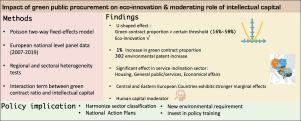When can green public procurement really stimulate eco-innovation? Considering the role of intellectual capital
IF 9.7
1区 环境科学与生态学
Q1 ENGINEERING, ENVIRONMENTAL
引用次数: 0
Abstract
Green public procurement (GPP), as a demand-side environmental policy tool, has advantages in mitigating underinvestment in eco-innovations. However, the innovation effects of green procurement remain a subject of debate, empirical studies of this policy across sectors and regions remain insufficient either. This study uses European country-level panel data to empirically investigate how adding green keywords to the contract award criteria for public procurement promotes eco-innovation. It also explores the potential moderating role of intellectual capital on this effect. The finding shows that the impact of GPP on eco-innovation is U-shaped, with innovation being stimulated only when the proportion of green contracts exceeds a certain turning point, which ranges from 16% to 50% among studied samples. Human capital significantly reduces this threshold due to its ability to mitigate knowledge scarcity. The innovation effect is more pronounced in the sectors with service inclination. Western European countries, having implemented National Action Plans earlier, have a lower required threshold, whereas Central and Eastern European Countries (CEEC), with higher procurement intensity, exhibit stronger marginal effects.


求助全文
约1分钟内获得全文
求助全文
来源期刊

Journal of Cleaner Production
环境科学-工程:环境
CiteScore
20.40
自引率
9.00%
发文量
4720
审稿时长
111 days
期刊介绍:
The Journal of Cleaner Production is an international, transdisciplinary journal that addresses and discusses theoretical and practical Cleaner Production, Environmental, and Sustainability issues. It aims to help societies become more sustainable by focusing on the concept of 'Cleaner Production', which aims at preventing waste production and increasing efficiencies in energy, water, resources, and human capital use. The journal serves as a platform for corporations, governments, education institutions, regions, and societies to engage in discussions and research related to Cleaner Production, environmental, and sustainability practices.
 求助内容:
求助内容: 应助结果提醒方式:
应助结果提醒方式:


